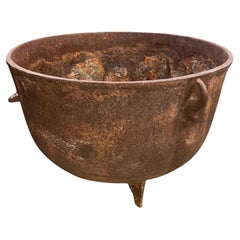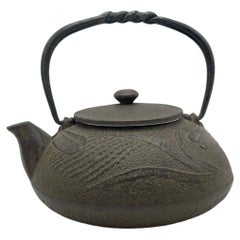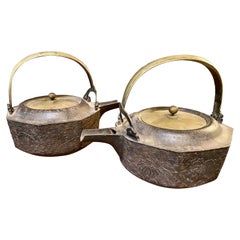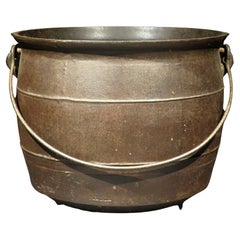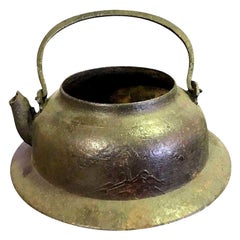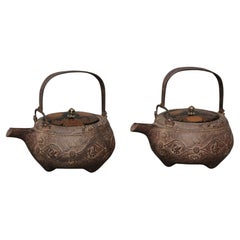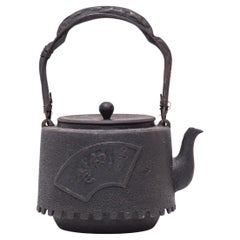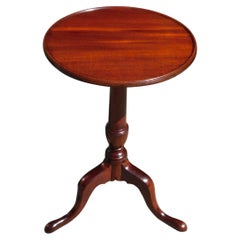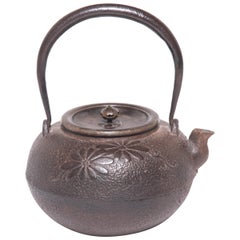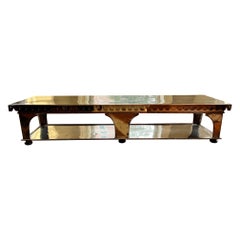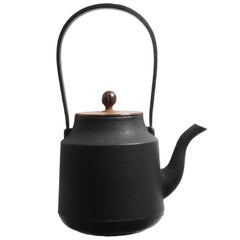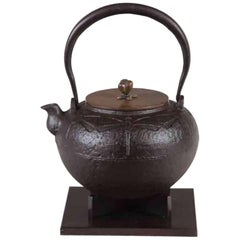Cast Iron Kettle
Antique Early 19th Century American Rustic Planters and Jardinieres
Iron
Vintage 1960s Japanese Tea Sets
Iron
Antique Late 19th Century Japanese Edo Metalwork
Brass, Iron
Antique Early 19th Century European Rustic Fireplace Tools and Chimney Pots
Iron
Antique Late 19th Century Japanese Meiji Metalwork
Iron
Antique Early 19th Century Japanese Antiquities
Silver, Iron
Early 20th Century Japanese Taisho Metalwork
Iron
Antique 1750s American Chippendale Candle Stands
Brass, Wrought Iron
Early 20th Century Japanese Meiji Metalwork
Bronze, Iron
Antique 1880s English Art Nouveau Sheffield and Silverplate
Silver Plate, Copper
Recent Sales
Antique 1850s Japanese Tea Sets
Iron
Antique Late 19th Century Japanese Meiji Jars
Bronze, Iron
Antique Late 19th Century Japanese Meiji Jars
Bronze, Iron
Antique Late 19th Century Japanese Meiji Jars
Bronze, Iron
Antique Late 19th Century Japanese Meiji Jars
Bronze, Iron
Antique Late 19th Century Japanese Meiji Jars
Bronze, Iron
Mid-20th Century Japanese Showa Antiquities
Iron
Early 20th Century Decorative Objects
Iron
Antique 18th Century and Earlier American Primitives
Iron
Early 20th Century Victorian Fireplace Tools and Chimney Pots
Iron
Vintage 1980s Japanese Showa Tea Sets
Iron
Antique 1880s Japanese Showa Tea Sets
Iron
Early 20th Century Japanese Meiji Metalwork
Iron
Early 20th Century Japanese Showa Metalwork
Iron
Early 20th Century Japanese Showa Metalwork
Iron
Antique 19th Century Japanese Metalwork
Iron, Copper, Bronze
Early 20th Century Japanese Metalwork
Iron
Early 20th Century Japanese Meiji Metalwork
Bronze, Iron
Early 20th Century Japanese Meiji Metalwork
Iron, Bronze
Early 20th Century Japanese Meiji Metalwork
Bronze, Iron
Early 20th Century Japanese Metalwork
Iron
20th Century Japanese Tea Sets
Iron
20th Century Japanese Tea Sets
Iron
Antique Early 19th Century German Pottery
Iron
Early 20th Century German Pottery
Iron
Antique 1880s Japanese Showa Pottery
Iron
Antique 19th Century Tibetan Planters and Jardinieres
Iron
Antique Early 19th Century European Rustic Planters, Cachepots and Jardi...
Iron
Early 20th Century Japanese Meiji Metalwork
Iron
Early 20th Century American Art Nouveau Planters and Jardinieres
Copper, Steel, Iron
Antique Early 19th Century Japanese Meiji Tea Sets
Brass, Iron
Antique Early 19th Century French Empire Fireplace Tools and Chimney Pots
Brass, Bronze, Wrought Iron
Early 20th Century Japanese Meiji Antiquities
Iron
Early 20th Century Tea Sets
Iron
Early 20th Century Japanese Meiji Metalwork
Bronze, Iron
Antique Late 19th Century Japanese Meiji Tea Sets
Iron
Antique 19th Century Planters and Jardinieres
Antique Late 19th Century Japanese Meiji Jars
Silver, Bronze, Iron
Antique Late 19th Century Japanese Meiji Jars
Bronze, Iron
Antique Late 19th Century Japanese Meiji Jars
Bronze, Iron
Antique 19th Century Dutch Planters and Jardinieres
Iron
Early 20th Century European Fireplace Tools and Chimney Pots
Iron
20th Century European Planters and Jardinieres
Iron
Antique 19th Century Bottles
Early 20th Century Japanese Tea Sets
Iron, Silver
Early 20th Century Japanese Japonisme Metalwork
Metal, Bronze
People Also Browsed
Antique Mid-19th Century English High Victorian Taxidermy
Other
21st Century and Contemporary American Bohemian Chandeliers and Pendants
Brass
Vintage 1930s Japanese Tea Sets
Iron
Antique 19th Century Japanese Antiquities
Bronze, Iron
Antique Late 19th Century Serving Pieces
Brass, Copper, Iron
Vintage 1920s Indonesian Organic Modern Planters and Jardinieres
Steel
Early 20th Century American Rustic Fireplace Tools and Chimney Pots
Iron
Cast Iron Kettle For Sale on 1stDibs
How Much is a Cast Iron Kettle?
- 1stDibs ExpertMay 3, 2024The difference between iron and cast iron comes down to content. Iron is generally pure iron, a chemical element that is a solid metal at room temperature. Cast iron is a mix of iron, carbon, silicon, manganese, sulfur, phosphorus and other elements. Both iron and cast iron can be used to produce furniture, cookware, decorative objects and other items. Generally, cast iron is heavier than iron. Shop an assortment of iron and cast iron pieces on 1stDibs.
- Who invented cast iron?1 Answer1stDibs ExpertMay 3, 2024The name of the person who invented cast iron is unknown. However, anthropologists and archaeologists have determined that the ancient Chinese were the first to develop it. The earliest known examples of cast iron date back to the 6th century B.C. Cast iron production didn't begin in Europe until the 14th century A.D. Shop a collection of cast iron furniture and decorative objects on 1stDibs.
- What are cast iron columns?1 Answer1stDibs ExpertMay 5, 2023Cast iron columns are vertical supports produced out of cast iron, a material made from iron and alloys with a carbon content of more than two percent. During the 19th century, cast iron columns were used in architecture. Today, they primarily function as decorative objects. Shop a range of cast iron columns on 1stDibs.
- How do I hang a cast iron bell?1 Answer1stDibs ExpertMarch 22, 2022How to hang a cast iron bell depends on the style. Some cast iron bells have loops at the top that you can hang from a hook anchored onto your desired mounting surface. Others have brackets or frames that you can secure with mounting screws. On 1stDibs, shop a selection of cast iron bells.
- Are cast iron columns hollow?1 Answer1stDibs ExpertMarch 31, 2023Whether cast iron columns are hollow depends on the piece. Most cast iron columns are hollow due to the manner of crafting, but some are solid. On 1stDibs, find a selection of columns.
- 1stDibs ExpertFebruary 17, 2023Yes, you can generally use cast iron as a planter because the material is durable and sturdy. However, you may need to drill drainage holes in a cast iron piece that wasn't intended to function as a planter to allow excess water to exit the vessel. On 1stDibs, find a selection of cast iron planters.
- Do cast iron tables rust?1 Answer1stDibs ExpertMay 5, 2023Yes, cast iron tables can rust. Pieces are more likely to develop rust when exposed to humidity, such as in bathrooms or outdoor living spaces in coastal areas. Wiping surfaces clean regularly and touching up scratches and chips can reduce the risk of rust. On 1stDibs, shop a selection of cast iron tables.
- Do cast iron Firebacks work?1 Answer1stDibs ExpertAugust 24, 2021Yes, cast iron firebacks are quite sturdy and work really well. As they are made of solid iron, it's a challenge to move and place them. Given that, cast iron firebacks are the best protection for the back wall of the fireplace. Find a variety of firebacks on 1stDibs.
- 1stDibs ExpertSeptember 25, 2019
To keep a piece made of cast iron from rusting, place it in a cool, dry space with good air circulation.
- 1stDibs ExpertAugust 17, 2021Cast iron trivets are used for many things but are especially ideal for slow cooking meat. They can prop up food in Dutch ovens to prevent burning and increase heat distribution.
- 1stDibs ExpertMarch 22, 2022Cast iron doorstops originated in the late 18th century. Osbourn Dursey invented the first doorstop in 1878. Decorative cast iron stops became popular in the 1920s and remained so throughout World War II. On 1stDibs, shop a variety of antique cast iron doorstops.
- 1stDibs ExpertSeptember 25, 2019
Cast iron is stronger than steel.
- 1stDibs ExpertMarch 22, 2022A cast iron fireplace insert is a firebox that fits into an existing fireplace surround. The insert is made of cast iron, a type of iron that is more than 2 percent carbon. Cast iron is highly durable and very resistant to the effects of heat. You'll find a selection of cast iron fireplace inserts on 1stDibs.
- Does cast-iron furniture rust?1 Answer1stDibs ExpertSeptember 25, 2019
Yes, cast-iron furniture rusts.
- 1stDibs ExpertApril 5, 2022Cast iron is frequently used for fireplaces due to its properties. The metal is highly durable, allowing it to hold up to the effects of frequent use. It also readily conducts heat to help warm up interiors. You'll find a variety of cast iron fireplaces on 1stDibs.
- 1stDibs ExpertMarch 31, 2023Cast iron is often used for benches because of its characteristics. Its strength makes it well-suited to support the weight of two or more adults, and its hardness allows it to resist damage due to weather exposure. Shop a range of cast iron benches on 1stDibs.
- When were cast iron beds made?1 Answer1stDibs ExpertFebruary 22, 2021Cast iron beds were made starting in the 1850s. These types of beds were handmade until World War I through the use of molds.
- 1stDibs ExpertSeptember 25, 2019
Unlike cast iron, wrought iron is not brittle and will bend rather than break. Wrought ironwork is produced with a hammer and anvil and tends to be more intricate than cast ironwork, which is characterized by repetitive designs that can be carved into a wooden pattern and cast.
- 1stDibs ExpertApril 5, 2022Yes, cast iron umbrella stands and anything made of cast iron can rust. Keeping your cast iron umbrella stand away from moisture and humidity is the best way to keep it from rusting. However, because it is designed to hold wet umbrellas that may be impractical. Some people like to paint cast iron to protect it from rusting. You’ll find a variety of cast iron and other umbrella stands from some of the world’s top sellers on 1stDibs.
- 1stDibs ExpertFebruary 13, 2023Whether cast iron garden furniture lasts depends on the quality of the pieces and how well you care for and maintain them over time. Many people choose cast iron, aluminum, wicker or rattan garden furniture for their outdoor patio sets. Shop an assortment of garden furniture on 1stDibs.
